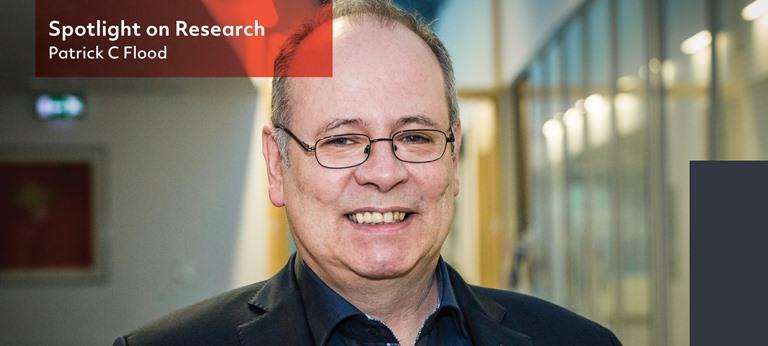

Spotlight on research: Insights into leadership
Professor Patrick C Flood, Professor of Organisational Behaviour, DCU Business School and Co-Director of the Leadership and Talent Institute speaks to Spotlight on Research about his work.
You carry out research on effective leadership, what makes a good leader?
"Most leaders go through a journey of personal development. Along that journey it is important to listen.
That’s a common factor among successful CEOs I have interviewed, they appreciate that you have to stop talking and listen. It’s not always easy, but it gives you the capacity to learn from feedback and to grow as a leader.
There are other factors of course- personal integrity, courage and vision, capacity to enroll the support of others and understanding the business model.”
How did you become interested in this area?
“I have been interested in leadership from a young age. My father worked with Irish Cement Ltd. and was an excellent leader.
We had a lot of conversations about business and I observed the way he approached interacting with people and solving problems.
It gave me an interest in the area.”
What kind of studies did you do to move into research on leadership?
“I did an undergraduate degree in business in UCD, then a Master’s degree specializing in Organisational behaviour and HR Management.
I also did a PhD at the London School of Economics. My consulting experience with companies gave me insights into good and bad leadership and when I came to DCU in 2007, this was an area I wanted to adopt.
My research work on persuasive leadership with Steve Carroll at the University of Maryland has had a big influence as has work on top teams with Professor Ken Smith at the same university.
In 2016, I co-founded the Leadership and Talent Institute in DCU Business School with my colleagues Prof David Collings and Professor Janine Bosak to provide a focused institute for the School’s excellent HR Management and Organisational Psychology Group. It helps to showcase their excellent research and teaching.
We have important engagement partnerships with the Irish Times and the Great Place to Work Institute.”
Where do you get your information on which to base your research about leadership?
“A lot of it is based on working with companies, teaching executives and interviewing leaders. I published a book with Johan Coetsee called Change Lessons from the CEO, based on interviews with 27 CEOs in the UK and Ireland.
I get a lot of ideas from teaching MBA students and business executives, and I use experiential exercises with them such as getting them to reflect on their leadership -past, present and future using life story analysis. Jason Sherlock’s new book, ‘Jayo’, originated in the life story work he did with us."
Do they find it effective?
“Yes, though sometimes it can take a while to realize the impact of doing that kind of reflection. When I was working at London Business School one of our faculty instructors on the ITP teaching development programme got us to write our own obituaries.
It remains one of the most important pieces of self-reflection I have done, and I see the value of ‘growing into’ the aspirations you set out for your future self.”
What research is keeping you busy now?
“At any one time, I have about six different projects on the go, and they often include collaborations with colleagues at Carnegie Mellon University (Denise Rousseau), HEC Montreal (Denis Chênevert) and Tilburg University (Steven Kilroy).
Right this minute I am working on a book project with colleagues in Waterford Institute of Technology (Chris O Riordan and Felicity Kelleher).
We are conducting interviews concerning ‘outsider leadership’ where people join an organization as leaders, but they come in from a different context.
That might be a Dutch person acting as CEO of an Irish business, a leader from banking who joins the civil service or maybe it’s a private sector CEO coming in to lead a family business.
We are interviewing leaders to see how they transfer into those new contexts, and how can people do it effectively.”
When the book is finished, what will the next big project be?
"A big one is the project with my colleague, Professor Na Fu in Trinity College. We are investigating how you manage paradoxes such as the need to reward exceptional performers in teams while maintaining the need for consistency in rewards across the team. The context we are looking at is that of a large global consulting firm. I am also interested in the leadership life stories of refugees and asylum seekers’’
What do you like to do when not researching, teaching or writing books?
“I really place value on spending time with my wife and children. I also like to walk and read and to fish – fishing is like a form of meditation, you are in the outdoors with nature all around you, and you are keeping still and focusing at the tip of the rod.
Mind you, fishing is a conceptual project right now!”
What tips would you give to aspiring leaders?
“Listen. Volunteer, put your hand up for complex new tasks and assignments, you will always learn from them.
Realize that leadership takes many forms, it is not just a position, it is also those things you do to support others, how you communicate and make things happen.”
